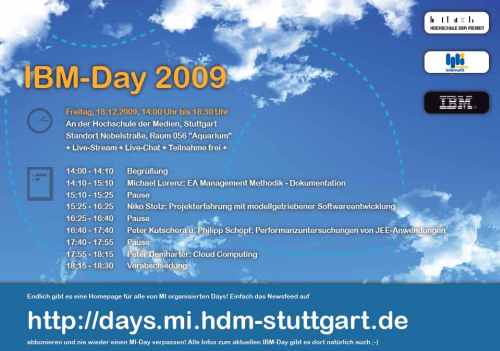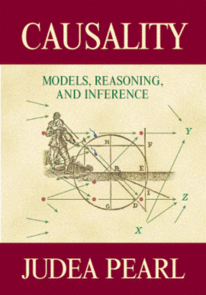What's New
- 9.IBM Day at HdM, from Apps to Clouds
-

Another IBM Day packed with important topics and trends in IT, presented by senior architects and management consultants. And also a chance to meet some old friends of our faculty like Peter Kutschera who will present the development of a mobile media strategy for a large insurance company, including technical developments. Thomas Wappler will talk about the tension between the "art" in programming and the efficiency expectations of professional development and show us ways to combine both successfully. And Peter Demharter - well known from his talks on the next generation internet, IPV6 etc. will demonstrate the dramatic changes in data center technology - especially in the area of networking - caused by the drive to cloud computung. Expect some deep insights into one of the fastest moving areas of IT: there is no google and no facebook without the associated data center technology!
So join us shortly before Christmas for an interesting afternoon with ample opportunities to learn and discuss current topics and meet experienced architects and consultants.
Agenda: detailed version (pdf) . 12.30 - 12.45 Welcome (Bernard Clark, IBM and Walter Kriha, HdM)
 12.45 - 13.14 Mobile Enterprise Strategie – Peter Kutschera
(Senior IT Architect, IBM)
12.45 - 13.14 Mobile Enterprise Strategie – Peter Kutschera
(Senior IT Architect, IBM)
 14.00 - 15.00 Prozessverbesserung in der Anwendungsentwicklung,
oder: Programmierer lassen sich nicht programmieren .
Thomas Wappler (Senior Managing Consultant, IBM)
14.00 - 15.00 Prozessverbesserung in der Anwendungsentwicklung,
oder: Programmierer lassen sich nicht programmieren .
Thomas Wappler (Senior Managing Consultant, IBM)
 15.15 - 16.15 Erfordern heute Cloudbasierte Technologien neue Data Center Strukturen?
Peter Demharter (Senior IT Architect, IBM)
16.15 Wrap-Up
15.15 - 16.15 Erfordern heute Cloudbasierte Technologien neue Data Center Strukturen?
Peter Demharter (Senior IT Architect, IBM)
16.15 Wrap-Up
Note
Friday December 9, 12.30 - 16.15 at HdM, room 56 (aquarium). A live stream with chat is provided. As always, the event is free of charge and open to the interested public. Directions can be found at the hdm homepage.
- 1.Energy Day at HdM, what keeps us going?
-
 Are you wondering about your energy bills in the future? Perhaps you are thinking about renovating and isolating your home to get better energy efficiency? Or you are planning to buy a new car and are wondering about its engine: could it be an electrical one?
Are you wondering about your energy bills in the future? Perhaps you are thinking about renovating and isolating your home to get better energy efficiency? Or you are planning to buy a new car and are wondering about its engine: could it be an electrical one?Those are rather common questions but the fundamental change in energy technology which is waiting for us will touch many other areas as well. Smart meters and smart grids will allow dynamic adjustments of energy supply and, yes, consumption. This does not sound quite so harmless and many start worrying about "the spy in our homes" represented by computers who not only calculate the energy consumption but also control household devices and finally user behavior. Is this a fair architecture for the citizens?
In his talk Chris Lindemüller will discuss the pros and cons of intelligent metering with respect to our privacy and security.
But perhaps your current concern is on saving money by renoating your home? Uwe Schulz has done exactly this and will present his experiences in doing so. He will explain the technology, costs and time needed. Are the results satisfactory? Let me just tell you that the results are quite surprising.
Uwe Schulz will end his talk with a vision of alternative energy based on the experience with his own house. Ludwig Karg - chief coordinator for the research around the E-Energy program will go into more details on this vision and show us how smart grids (the intelligent power grid of the future) and electro-mobility will allow a fundamental change in our energy production and consumption. Hopefully a change that will make Fukushima the last disaster of the nuclear energy complex.

Perhaps you are wondering: how come that energy is a topic at the media university? The sub-title is "what keeps us going?" and it is emotion that keeps us going! And emotion has always been at the core of media (social media have only emphasized this fact). Media and its enabling computer science technology are therefor right at the core of the discussions around a new energy paradigm.
Note
Friday June 10, 13.20 - 17.00 at HdM, room 56 (aquarium). A live stream with chat is provided. As always, the event is free of charge and open to the interested public. Directions can be found at the hdm homepage.
- 9th Games Day at HdM
-
 Game development and game economics cover many different areas. Proof for this can be found at out 9th Games Day. Long before others recognized its importance, community management has been a core feature of game economics and MMOGs like World of Warcraft have made important discoveries on user behavior and managment. Andreas Stiegler (well known from many talks and the organization of our Summer Game University) will give us an introduction to this exciting field. Andreas is currently working towards a PHD in game AI.
Game development and game economics cover many different areas. Proof for this can be found at out 9th Games Day. Long before others recognized its importance, community management has been a core feature of game economics and MMOGs like World of Warcraft have made important discoveries on user behavior and managment. Andreas Stiegler (well known from many talks and the organization of our Summer Game University) will give us an introduction to this exciting field. Andreas is currently working towards a PHD in game AI.A successful game - especially in the 3D area - needs fast and credible physics driven by a physics engine. Norman Pohl, researcher and lecturer in our faculty will explain the secrets of high-performance physics in games.
.I met Martin Nerurkar of Gameforge in Karlsruhe during the games camp, organized by Steffen Waltz and MfG. He is going to show us the difficulties and opportunities in design and marketing of virtual goods - an idea that is currently reshaping the whole games industry and game landscape.
And last but not least Paul Lawitzki from our sister-faculty Audio-visual media will demonstrate the game Big Time Monkey and the story behind it. He will also tell about current game projects at HdM.
During the breaks current games and consoles can be seen and tried in the lobby..
Many thanks go to the aktuelle themen team, Benjamin Thaut, Stephan Soller and many other gamers for organizing this day.
Note
Friday May 27, 13.20 - 17.15 at HdM, room 56 (aquarium). A live stream with chat is provided. As always, the event is free of charge and open to the interested public. Directions can be found at the hdm homepage.
